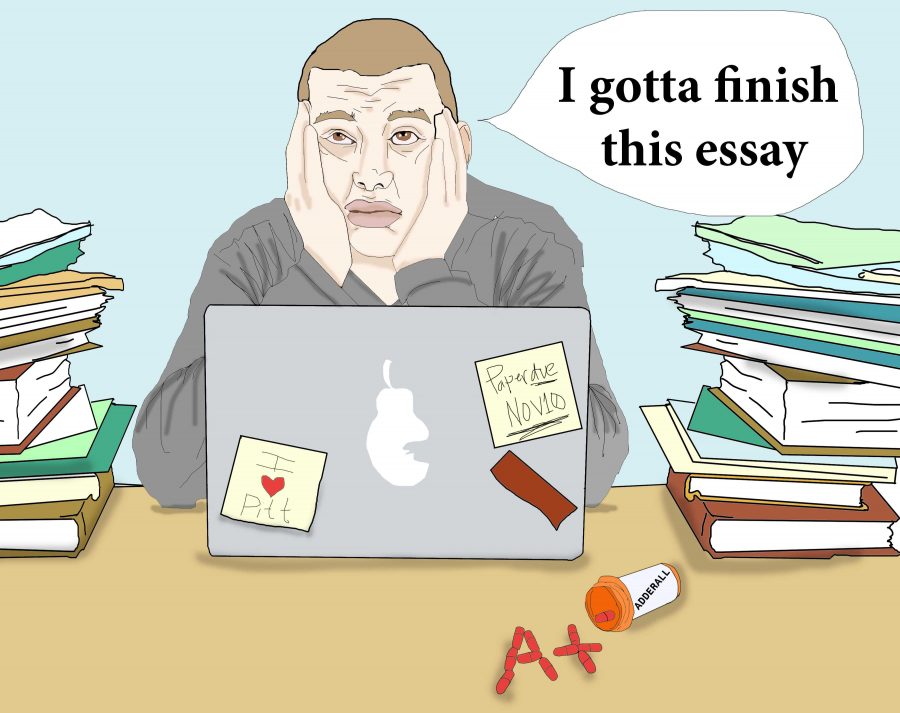“I took eighteen credits this semester and got straight A+’s, all thanks to Adderall!”
Students affectionately call Adderall everything from a “study drug” to “accomplish mints.” On a rigorous college campus, Adderall — like steroids — helps students who are non-prescription users concentrate when studying or in lecture. For them, the drug aides in learning large volumes of information in a short period of time and ultimately helps to boost one’s GPA. Blew off Friday and Saturday to party? Just take Adderall.
While Adderall may help some students focus in the microeconomics lecture they have no interest in, someone with attention deficit disorder, like myself, needs Adderall prescriptions to focus even when they are interested.
The popular usage of Adderall on college campuses only helps to perpetuate the idea that “everyone has ADD,” which undermines the struggle of those who actually have the disorder.
For me, distraction and falling behind on assignments because I just can’t maintain attention long enough is a disability, a serious one that requires medication.
Nonetheless, according to a 2014 survey done by the Partnership for Drug-Free Kids, one in five college students abuse the prescriptions I need just to function.
This widespread abuse of drugs prescribed for ADD looks past a serious condition that impedes on many students’ academic and social lives.
According to the Anxiety and Depression Association of America, 4 percent — or 8 million — Americans suffer from ADD. While the causes of ADD are virtually unknown, psychologists believe there is a link between it and family history, meaning genetics likely plays a role.
Characterized by trouble focusing, impulsivity, disorganization and restlessness, ADD’s seemingly bearable symptoms overarch into many facets of one’s personal life.
For example, without my medication, I have to dedicate six hours to finishing a homework assignment that may take someone without ADD two hours. Sitting down and focusing on a task as monotonous and unstimulating as reading — even when I love the topic — can cause me to feel uneasy, causing me to hyperventilate. So, in this span of a six hours, I might skirt away from this stress and decide to make cupcakes, an activity requiring my mind to focus on a variety of tasks, only to return to the assignment after I put on the icing.
Even planning ahead of time to complete an assignment before it’s due is difficult for me, because ADD impedes my organizational skills. I may mentally make a note to myself I have an assignment due in a week, but despite having time to do it within those several days, I end up cramming to finish it the night before.
While my ADD has influenced my academic life profoundly, my social life is also a victim of ADD. Ryan Gosling could be saying sweet nothings to me and, rather than lingering on his every word, I’d be focused on the neat design on his tie or get side-tracked by how his voice resembles my second cousin’s, causing me to wonder how that cousin’s surgery went last week.
People may assume that, because of my “zoning out,” I don’t care or value what they have to say, or I’m not interested in them, which just isn’t true.
For me, ADD medication allows me to keep up with my assignments as well as behave more appropriately and pay attention to friends and loved ones, both major parts of any normal student’s life. That’s why I never understood how so many students could view drugs like Adderall so lightly.
The nonchalant mindset surrounding Adderall may stem from the current widespread overdiagnosis of ADD. With this phenomenon, many misconceive the severity of ADD. After all, if so many people have it and are diagnosed so readily, it can’t be all that serious. This rationale may fuel the abuse of ADD prescriptions, labeling the disorder not only as normal, but as non-severe.
In a 2011 study published in the journal The Clinical Neuropsychologist, 22 percent of participants who claimed to suffer from attention-deficit/hyperactivity disorder tried to skew test results to make their symptoms look worse.
Many doctors have said this wave of overdiagnosis is placing medication in the hands of people who are fully capable of adequately functioning without a prescription, furthering the use of ADD prescriptions by those without ADD.
According to data from the Centers for Disease Control and Prevention, the number of children on medication for ADD has increased from 600,000 in 1990 to 3.5 million in 2013. Parents and doctors seem to classify kids with the slightest behavioral or academic problems as having a disorder, risking any side-effect.
Dr. Keith Conners, in a 2013 interview with the New York Times, said “The numbers make it look like an epidemic. Well, it’s not. It’s preposterous. This is a concoction to justify the giving out of medication at unprecedented and unjustifiable levels.”
Unless your inability to focus is intruding on virtually every dimension of your life, you don’t need a prescription.
Marlo Safi primarily writes about public policy and politics for The Pitt News.
Write to Marlo at [email protected]



